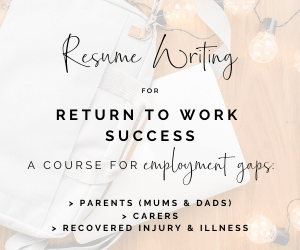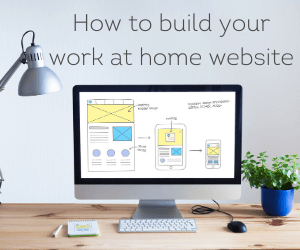When you’re a parent that has gone back to work, whether that be full time, part time, working from home or in an office, work can very easily take over your life. It’s important to not become overwhelmed and be able to strike a work life balance.
There are many benefits to keeping a good work life balance including reduced stress levels, higher job satisfaction, being able to enjoy and participate in family and social life, more time for personal hobbies and better health.
For parents it can seem hard to find a balance that suits your work, yourself and your family. For work at home parents, it can seem even harder to find that balance because you are constantly engrossed by all three, all the time. It can be achieved, but you may need to make some changes and set some boundaries.
Achieving a work life balance
A great analogy I’ve heard is to consider everything in life as a ball. Work, kids, partners, family, friends, everything in your life is one ball. It’s very hard to catch all those balls as once, and if you try, you’ll end up dropping them all. Sometimes you have to put a few balls down in order to catch the most important one. That doesn’t mean that the other balls aren’t important, they’re just not the most important one RIGHT NOW.
Maybe you have a deadline at work that makes that ball the one to concentrate on, or you child has something on at school that puts that ball ahead, or it’s your best friends’ birthday and you haven’t seen them in the last few months. Work life balance is achieved when you can prioritise the most important balls and put the other ones on the ground to be picked up later and not feel guilty about it. Stop trying to juggle them all at once and realise that if you are, they’ll all end up crashing on the ground.
To achieve a healthy work life balance, you just have to know where to start and how to identify when you’re going off course, so you can pull yourself back in line and continue enjoying life to the fullest. So here are some tips on how to achieve a healthy work life balance as a parent.
- Set realistic boundaries
Decide WHEN you will be working. The only way that a balance can be maintained is through setting, and sticking to, boundaries that work for you and your family. If you have a set schedule from work, that will make it easier to know when your working and non-working hours are. If you don’t, then talk to your boss about any family needs you have to make sure these don’t overlap.
If you’re self-employed, choose what hours you wish to work. This could look like the number of hours you work or the times during the day that you work. You may need to work around nap time or school time or you may need to work in the evenings to accommodate everyone. Ensuring that all parties (kids and partner) know when your work times are will set those clear boundaries and keep guilt at bay.
When you set boundaries around your work schedule, also ensure that you set time aside for you – you need to have a break from work and family every day. This time includes eating breaks and breaks to rest your mind and your body.
Remember work is work and leave it as such. When you’re spending time on hobbies or with family, leave your work behind and concentrate on the enjoyment of what you are currently doing. You’ll also be more able to focus on work while you are doing it if you can separate work and personal in your mind.
- Work with your boss for flexibility
Be upfront with your boss about what you can do, so then your boss will have his/her expectations spot on from the get go. Keep your promises, and if you have any problems at all keeping up with things, let your boss know right away. By being open and honest with your boss, you’ll find your boss to afford you the flexibility you need, when you need it.
You may even find that you can approach your workplace about working from home. There are many reasons this can be a good idea, and the no commute can go a long way to helping work life balance. How to get your employer to allow you to work from home gives you a starting point for having that conversation.
- Prioritise and set goals
Remember the ball analogy earlier? Prioritise what is most important right now and achieve that. This will change every month, week or even day. Sometimes the priority will be work, other times family, friends or yourself.
Obviously sometimes there are commitments that you have to adhere to but if you prioritise what you value the most it will go a long way to having a feeling of contentment in what you are doing.
- Keep weekends (or your time off) free for family
During the week, it really can be like a never-ending merry-go-round – and one that gets faster and faster. So keep your time off free for your family or friends, and for doing those chores around the house so you’re not stressed about them after work.
- Make your partner do stuff
We aren’t doing these in importance order, but I feel like if we were this should be at number one!
As a society, even full time working mothers tend to shoulder the majority of the household organisation, even if not always the actual doing. When you’re a stay at home mum, everything regarding the home and kids tends to be lumped onto your shoulders, and this tends to just continue when you go back to work.
If you are deciding to head back to work, make sure your partner (if you have one) understands that they need to shoulder some of the responsibility. And this doesn’t just mean doing a bit more housework, or cooking some nights, but the organisational baggage as well (otherwise known as the mental load), such as organising what the kids need for the week ahead, where everyone needs to be, meal planning, etc etc.
- Spot clean only during the week
We all like a tidy house, but don’t put yourself through the stress during the week of doing a major clean and tidy. Just spot clean where needed, so you can maintain the tidiness of your home, and only do major clean-ups as needed when you have the time. And make sure your partner and kids are tidying up too – if they live in the house they can keep it clean.
- Outsource if you can
If you are able to, look into outsourcing things like cleaning to a professional. Help is available in every area, and you can also get help when it comes to baby-sitting, gardening – even cooking.

- Create a task list for each day
When you’re working, create a task list for each day. Do the most important, pressing tasks first. Also, avoid falling into the trap of leaving the difficult, dreaded tasks until later in the day. Tackle them first thing and use the momentum created by completing that task, to work through the remaining tasks for the day.
If you’ve finished your most pressing work first, this also goes a long way to you being able to finish work at your designated time, rather then needing to stay to get something done.
- Don’t be so hard on yourself
As a working parent, don’t be too hard on yourself and know that your task lists, and work routine are flexible. Do your best, and let the little things slide.
It’s a big deal adjusting to being back at work, particularly after your first child, so if you’re finding it all a bit challenging don’t worry it will get easier.
- Identify your stress triggers
Stress is something that we all deal with at some point in our lives and it can often creep up on us without us realising, until our hearts race or our blood boils, and then it’s too late.
Working parents often find themselves dealing with a myriad of stress-inducing situations and work at home parents even more so. Whether it’s dealing with a business call while your toddler refuses to eat their lunch or trying to meet a tight deadline on next to no sleep.
And because by their very nature, work at home mums are usually at home, they may find themselves playing the role of worker, carer, and cleaner. And if there’s one thing that can bring on a stress attack, it’s a messy house merely hours after you’ve cleaned it.
Once you’ve identified your stress triggers, do what you can to release the stress in safe and healthy ways – spend time outdoors, move your body, reflect. Make time for yourself to destress and work on strategies to return to a balanced state of mind.
- Take time out for you
A healthy work life balance is hard to maintain if you find that you are constantly looking out for other people – your clients, your boss, your colleagues, your children, your partner – and never considering your own needs and wants.

Yes, there are times when you need to put yourself second to get through all the things that need to be done. And in the same way, there are times when you need to give yourself permission to put yourself first.
Do you have a hobby? Do you turn off your device? Do you spend time away from the children? Do you ever just sit in silence and breath? Set aside an hour or so a day just for you. It could be a nice hot bath or a meditation, or just reading a book. This way, you can rest, relax and recharge. It will work wonders for stress as well.
Mums are wonderful at getting things done and looking after everyone else. They’re also notorious for feeling guilty whenever they put themselves first. It’s a habit that can be difficult to change, but it needs to happen if you are committed to finding a happy work life balance.
- Maintain health and fitness
Eat right and exercise daily! Even something as simple as a 20 minute walk can work wonders for your health and your well being. Exercise also produces endorphins and serotonin which are hormones that help boost your mood and overall sense of wellbeing.
- Create a really good support network for yourself
Friends and family are really important in helping you achieve work life balance, so create a good support network around you – a group of people you can call on for help and share your vents with. By being connected with others, stressful situations aren’t so stressful anymore.
And remember to ask for help when you need it. No one can do everything!
- Enjoy what you do
You’ll be less stressed if you are doing a job you love. Whether that’s going to work out of the home, working from home or running your own business, find something you are happy to do.
- Find time for your finances
A major stress point in life can be your finances. Make time to ensure that you know what money you have coming in and going out. If you need to, work out how to create and stick to a budget so that you’re not stressed about where you are going to get the money for your next bill. If you know what’s going on with your money, you can concentrate more on the other things in life.
- Learn to recognise fatigue and burnout
Try your best to recognise and avoid fatigue and burn out. Believe me, no part of your life will work effectively or have any enjoyment if you are burnt out and over stressed. If you can recognise the signs and respond and take some time for yourself, you will be the better for it.
- Remember happiness is everything
Sure it’s nice to have material things and luxuries, but at the end of the day your happiness and that of your family is paramount.
Return to work mums is a phrase that seems to conjure up judgement in some circles for a strange reason, especially if you’ve ever been on an internet parenting forum. Some people believe that you can’t have a successful career or business and be a good parent/partner/friend etc. I believe it comes down to successful work and life integration.
Remember, like most things, work life balance is subjective and different for everyone. While someone might want flexibility in work hours to allow for family, to someone else it may just mean being able to leave their work at work. The key is finding what it would mean to you and figure out ways to reduce life’s stressors so you can feel happy and content, and not pulled between your work and life.
Dealing with working mum guilt
After a period at home looking after children, there often comes a time when a mother may consider seeking outside employment. Whether this decision is based on finances, wanting to further your career, the need for external stimulation or simply because the youngest child has become more independent, it is an adjustment between the working life you had before children versus after them.
Often mothers feel extreme guilt when returning to work. There’s still a small, but pretty vocal, section of society which thinks mums shouldn’t work and if they do, they are doing it so they can buy pretty handbags and be ruthless career women. Add that to the enduring society norms of “it’s a mother’s job to look after her children” and that’s a lot of guilt piled on.
These working women don’t feel bad because they are doing something bad. They feel bad because society can be very mean to women sometimes. Ask a stay at home mum how much respect she receives and you’ll see this meanness is actually pretty universal whether you work or not.

The best way to deal with this working mothers guilt is to address it head on.
You are doing the mother’s job of looking after your children. You are earning money to feed, clothe and educate them. You are teaching them that you can have a fulfilling career and be a loving parent at the same time.
Some mums don’t feel guilty when they return to work. Some mums realise early on that stay at home mothering isn’t for them and recognise they will be a much better mum when they have a balance.
So then, they feel guilty for not feeling guilty. They feel like the working mums have to say how guilty they feel to each other and indulge in the mutual sympathy that brings. Saying you don’t feel guilt – which is actually a great thing – is a bit of an anomaly, and those mums can worry that it doesn’t go down well.
It is important not to listen to anyone who is being unsupportive or judgemental.
Remember that feeling guilty does no good. No matter what you do as a parent these days, someone will always think its the wrong option. If you are doing what is best for you and your family, it will make for a happy and less stressed mum in the long run.
If you’re organised and scheduling family time, you have nothing to feel guilty about, so just leave the guilt behind and enjoy the balancing act! Always remember the big picture and don’t get so bogged down in day-to-day details that you can’t take time to enjoy life.
So in summary: there’s the guilt for working.
Then there’s the guilt for not feeling guilty for working.
There’s the raw ache of looking at your child and just longing for a day of cuddles on the couch instead of the daycare run, work and pickup.
There’s the fact that, actually, you love your job and often look forward to going there, and the guilt that comes with that.
Then, finally, there is the realisation that regardless of what you do, you will all be fine. Your children, simply by virtue of being born in this country to parents who care enough to read articles like this one, are amongst the most privileged on the planet.
And, regardless of what you do, they’ll still blame you for everything when they are teenagers. And thank you for everything when they are adults. (Hopefully.)






